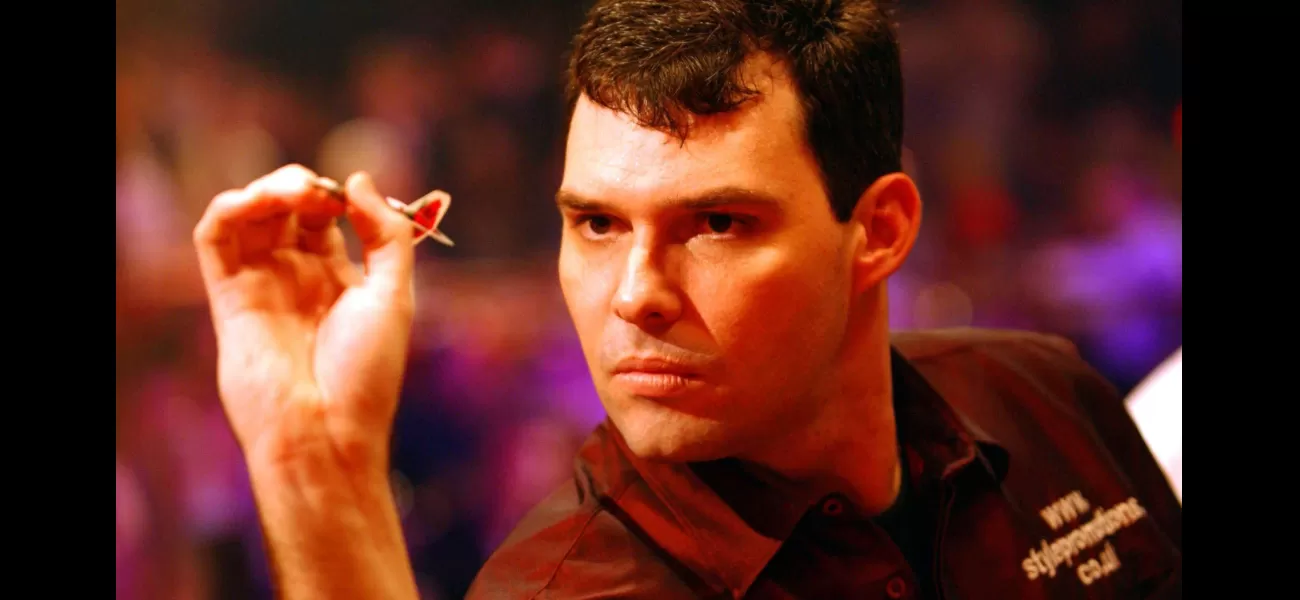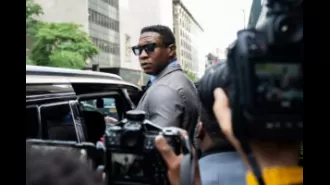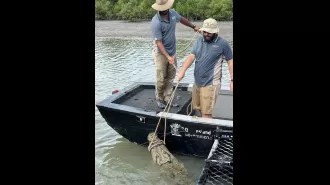Former Aussie darts champ reveals near-death experience from infected blood.
Tony David, nicknamed "the deadly boomerang," faced near-death due to treatments he got as a child in Queensland.
May 30th 2024.

Tony David was a renowned darts world champion, known for his unbeatable skills and the nickname "the deadly boomerang". However, his journey to success was not without its challenges. Growing up in Queensland, David had received blood transfusions as a child due to his haemophilia. Little did he know that the blood plasma he received was contaminated with hepatitis C, almost proving to be the deadliest boomerang of all.
Years went by, and in 2009, David's health took a drastic turn for the worse. He was diagnosed with stage 4 liver disease and given a grim prognosis - only six months to live. As a haemophiliac, David was no stranger to frequent hospital visits and treatments, but this time, it was a matter of life and death. Thankfully, he received a liver transplant, the first of three that he would need to survive the hepatitis infection.
David is not alone in his struggle. Along with thousands of other Australians, he contracted hepatitis C through contaminated donor blood in the 1970s to the early 1990s. Many of them were also infected with HIV. Despite the severity of the situation, they were not eligible for any compensation or support from the government.
Now, David is breaking his silence and speaking out about the infected blood scandal in Australia. He, along with other victims, is demanding a royal commission to investigate the matter, a formal apology from the government, and compensation for their suffering. This call for action comes after a similar inquiry in the UK found that the national health service knowingly exposed patients to infections through diseased blood and blood products, and concealed the truth about the disaster. The UK government has announced a compensation package of around A$19 billion for the victims.
Having survived the ordeal, David feels a sense of responsibility to speak up for those who have lost their lives and continue to suffer without proper support. He believes that what happened in the UK also happened in Australia and that there needs to be a proper review of the situation. As he puts it, "I am still alive to give my account. Yet so many aren't with us and more are suffering with no monitoring and efforts to give them life-saving transplants."
In 2004, a Senate inquiry was held into hepatitis C and the blood supply in Australia. It was revealed that between 3500 and 8000 Australians were living with hepatitis C contracted through blood transfusions, including around 1350 haemophiliacs. However, the victims claim that they never received the promised financial assistance or a formal apology from the government.
David, now 56, was diagnosed with haemophilia as a child when his body wouldn't stop bleeding after a circumcision. This was just the beginning of many hospital visits and treatments. As a baby, he would often experience painful swelling and bruises. At the age of four, a blood test confirmed his condition, and he started receiving transfusions of fractionated plasma from the Commonwealth Serum Laboratories, which was owned by the government. This plasma was made from pooled blood from thousands of donors, significantly increasing the risk of infections being passed on.
Although testing for hepatitis C in donor blood was introduced in 1987 in Queensland and 1990 nationally, it was already a known risk for the CSL as early as 1973, according to a product information sheet for Prothrombinex, the main form of treatment for type B haemophilia patients like David. This revelation highlights the negligence and lack of accountability in the infected blood scandal.
As he stood at the top of the darts world, Tony David was known as "the deadly boomerang". But little did he know that the true deadly boomerang was lurking in his past, in the form of blood plasma infected with hepatitis C.
It all started when David was just a child growing up in Queensland. Due to his condition as a haemophiliac, he received blood transfusions that unknowingly contained the deadly virus. It wasn't until decades later, in 2009, that David's health took a turn for the worse. He was diagnosed with stage 4 liver disease and given only six months to live.
Desperate for a solution, David underwent a liver transplant - the first of three that he would need to keep his life-threatening infection at bay. Sadly, David is not alone in his struggle. Along with thousands of other Australians, he was infected with hepatitis C through donor blood during the 70s and 90s. Some were even infected with HIV.
Despite the immense toll it has taken on their lives, victims like David have been denied any form of compensation or apology for the negligence that led to their infections. But now, David is speaking out in the hopes of bringing attention to Australia's infected blood scandal.
Inspired by the recent inquiry and resulting compensation for UK victims, Australian victims are calling for a royal commission to investigate the scandal, as well as a formal apology and compensation from the government. David himself is determined to see justice served, stating, "What happened in the UK happened here, too. I know many who have died from this and I know what happened to me - they need to have a proper review in Australia."
Back in 2004, a Senate inquiry was held into hepatitis C and the blood supply in Australia. However, victims claim that they never received the promised financial assistance or national apology. David, now 56, recalls his parents' discovery of his condition as a newborn, when they couldn't stop his bleeding after a routine circumcision. This was just the beginning of a lifetime of hospital visits and pain for David.
As a baby, his body would swell and bruise painfully, requiring frozen blood plasma to help his blood clot. At the age of four, he was diagnosed with haemophilia and began receiving transfusions from Commonwealth Serum Laboratories, which was owned by the government at the time. Unfortunately, the fractionated plasma used in these transfusions was pooled from thousands of donors, significantly increasing the risk of infections being passed on.
Despite knowing the risks, testing for hepatitis C was not implemented for donor blood until much later. Even a product information sheet from David's mother, dating back to 1973, showed that CSL was aware of the potential risk of hepatitis infection from plasma.
It's a tragic and infuriating situation for David and countless others who have been affected by Australia's infected blood scandal. But with his determination and the support of other victims, he hopes to bring about change and justice for those who have suffered.
Years went by, and in 2009, David's health took a drastic turn for the worse. He was diagnosed with stage 4 liver disease and given a grim prognosis - only six months to live. As a haemophiliac, David was no stranger to frequent hospital visits and treatments, but this time, it was a matter of life and death. Thankfully, he received a liver transplant, the first of three that he would need to survive the hepatitis infection.
David is not alone in his struggle. Along with thousands of other Australians, he contracted hepatitis C through contaminated donor blood in the 1970s to the early 1990s. Many of them were also infected with HIV. Despite the severity of the situation, they were not eligible for any compensation or support from the government.
Now, David is breaking his silence and speaking out about the infected blood scandal in Australia. He, along with other victims, is demanding a royal commission to investigate the matter, a formal apology from the government, and compensation for their suffering. This call for action comes after a similar inquiry in the UK found that the national health service knowingly exposed patients to infections through diseased blood and blood products, and concealed the truth about the disaster. The UK government has announced a compensation package of around A$19 billion for the victims.
Having survived the ordeal, David feels a sense of responsibility to speak up for those who have lost their lives and continue to suffer without proper support. He believes that what happened in the UK also happened in Australia and that there needs to be a proper review of the situation. As he puts it, "I am still alive to give my account. Yet so many aren't with us and more are suffering with no monitoring and efforts to give them life-saving transplants."
In 2004, a Senate inquiry was held into hepatitis C and the blood supply in Australia. It was revealed that between 3500 and 8000 Australians were living with hepatitis C contracted through blood transfusions, including around 1350 haemophiliacs. However, the victims claim that they never received the promised financial assistance or a formal apology from the government.
David, now 56, was diagnosed with haemophilia as a child when his body wouldn't stop bleeding after a circumcision. This was just the beginning of many hospital visits and treatments. As a baby, he would often experience painful swelling and bruises. At the age of four, a blood test confirmed his condition, and he started receiving transfusions of fractionated plasma from the Commonwealth Serum Laboratories, which was owned by the government. This plasma was made from pooled blood from thousands of donors, significantly increasing the risk of infections being passed on.
Although testing for hepatitis C in donor blood was introduced in 1987 in Queensland and 1990 nationally, it was already a known risk for the CSL as early as 1973, according to a product information sheet for Prothrombinex, the main form of treatment for type B haemophilia patients like David. This revelation highlights the negligence and lack of accountability in the infected blood scandal.
As he stood at the top of the darts world, Tony David was known as "the deadly boomerang". But little did he know that the true deadly boomerang was lurking in his past, in the form of blood plasma infected with hepatitis C.
It all started when David was just a child growing up in Queensland. Due to his condition as a haemophiliac, he received blood transfusions that unknowingly contained the deadly virus. It wasn't until decades later, in 2009, that David's health took a turn for the worse. He was diagnosed with stage 4 liver disease and given only six months to live.
Desperate for a solution, David underwent a liver transplant - the first of three that he would need to keep his life-threatening infection at bay. Sadly, David is not alone in his struggle. Along with thousands of other Australians, he was infected with hepatitis C through donor blood during the 70s and 90s. Some were even infected with HIV.
Despite the immense toll it has taken on their lives, victims like David have been denied any form of compensation or apology for the negligence that led to their infections. But now, David is speaking out in the hopes of bringing attention to Australia's infected blood scandal.
Inspired by the recent inquiry and resulting compensation for UK victims, Australian victims are calling for a royal commission to investigate the scandal, as well as a formal apology and compensation from the government. David himself is determined to see justice served, stating, "What happened in the UK happened here, too. I know many who have died from this and I know what happened to me - they need to have a proper review in Australia."
Back in 2004, a Senate inquiry was held into hepatitis C and the blood supply in Australia. However, victims claim that they never received the promised financial assistance or national apology. David, now 56, recalls his parents' discovery of his condition as a newborn, when they couldn't stop his bleeding after a routine circumcision. This was just the beginning of a lifetime of hospital visits and pain for David.
As a baby, his body would swell and bruise painfully, requiring frozen blood plasma to help his blood clot. At the age of four, he was diagnosed with haemophilia and began receiving transfusions from Commonwealth Serum Laboratories, which was owned by the government at the time. Unfortunately, the fractionated plasma used in these transfusions was pooled from thousands of donors, significantly increasing the risk of infections being passed on.
Despite knowing the risks, testing for hepatitis C was not implemented for donor blood until much later. Even a product information sheet from David's mother, dating back to 1973, showed that CSL was aware of the potential risk of hepatitis infection from plasma.
It's a tragic and infuriating situation for David and countless others who have been affected by Australia's infected blood scandal. But with his determination and the support of other victims, he hopes to bring about change and justice for those who have suffered.
[This article has been trending online recently and has been generated with AI. Your feed is customized.]
[Generative AI is experimental.]
0
0
Submit Comment





